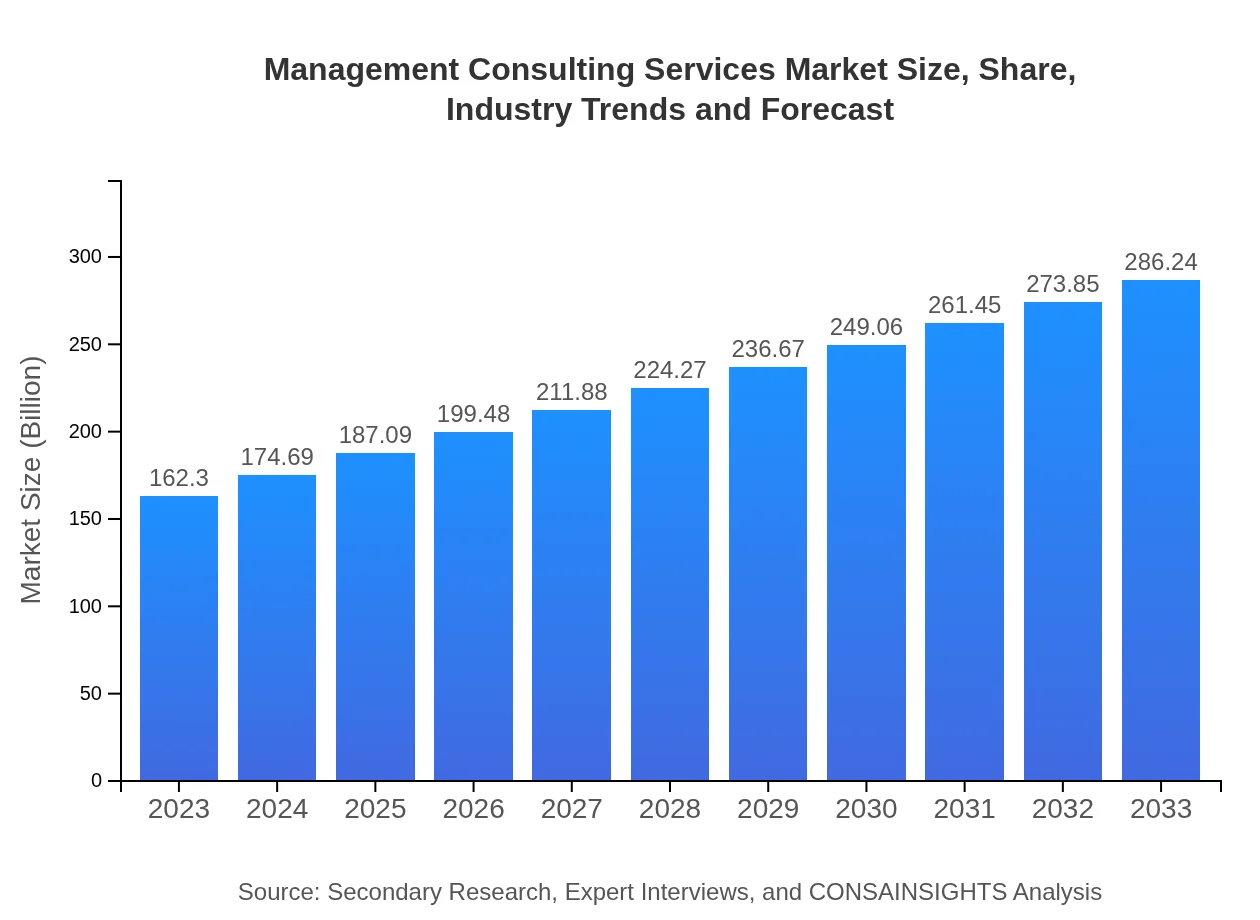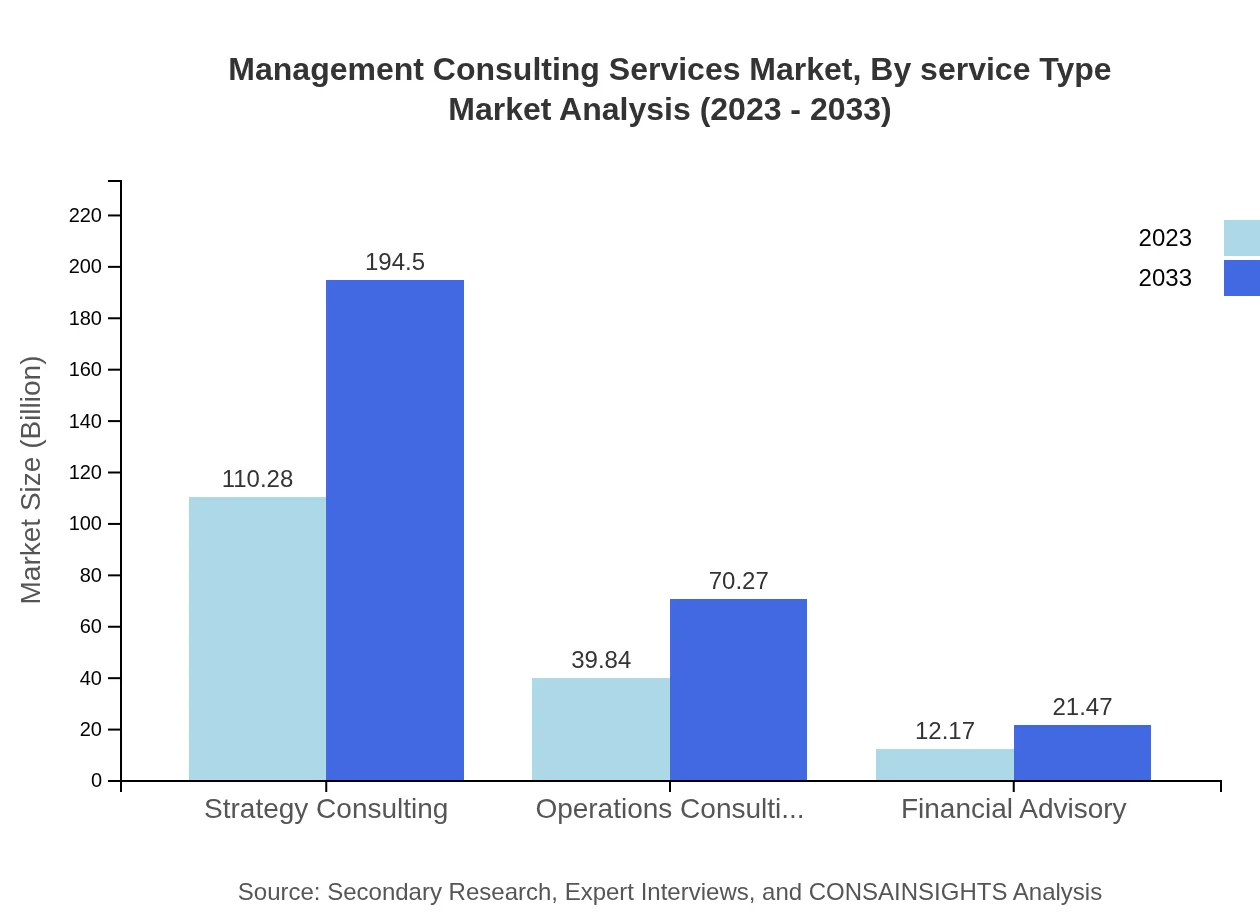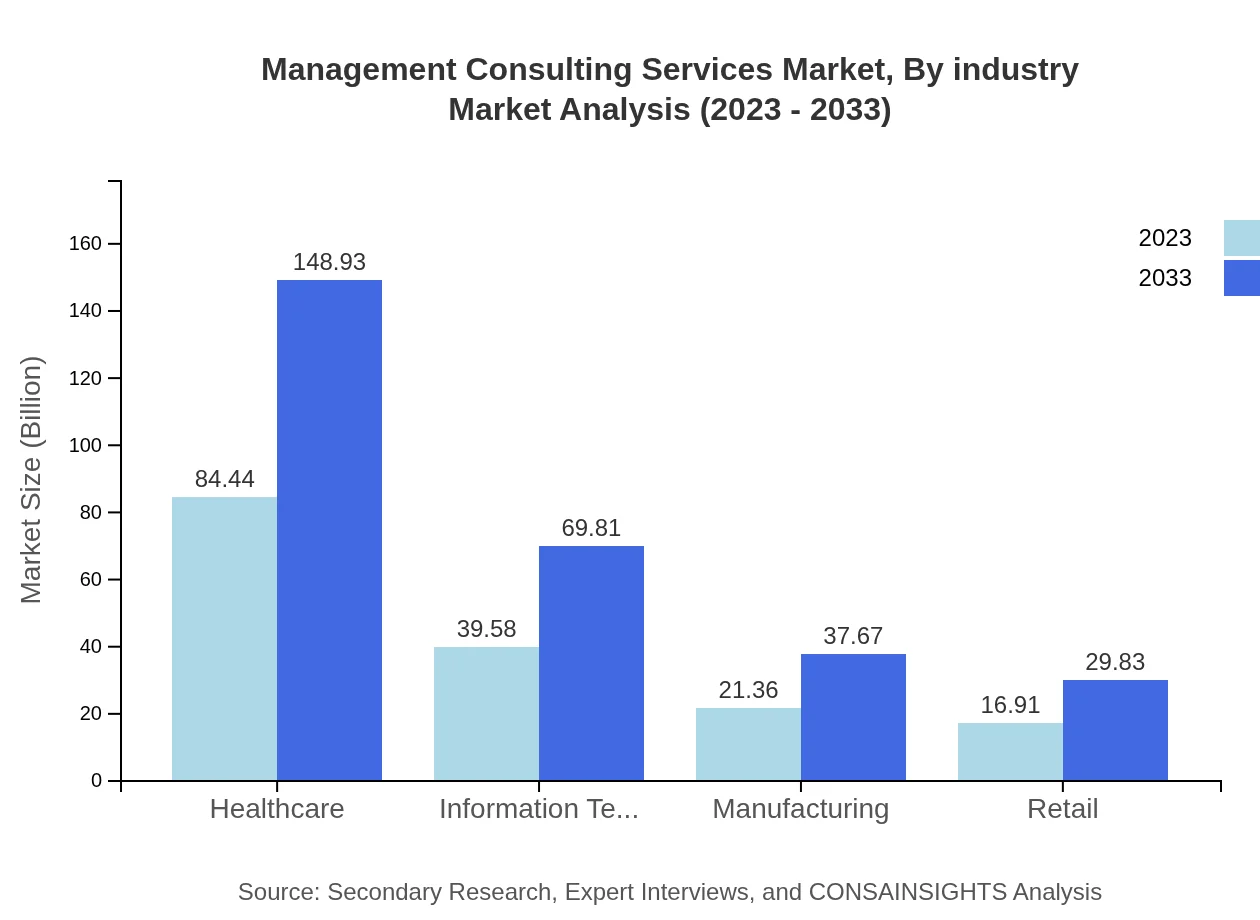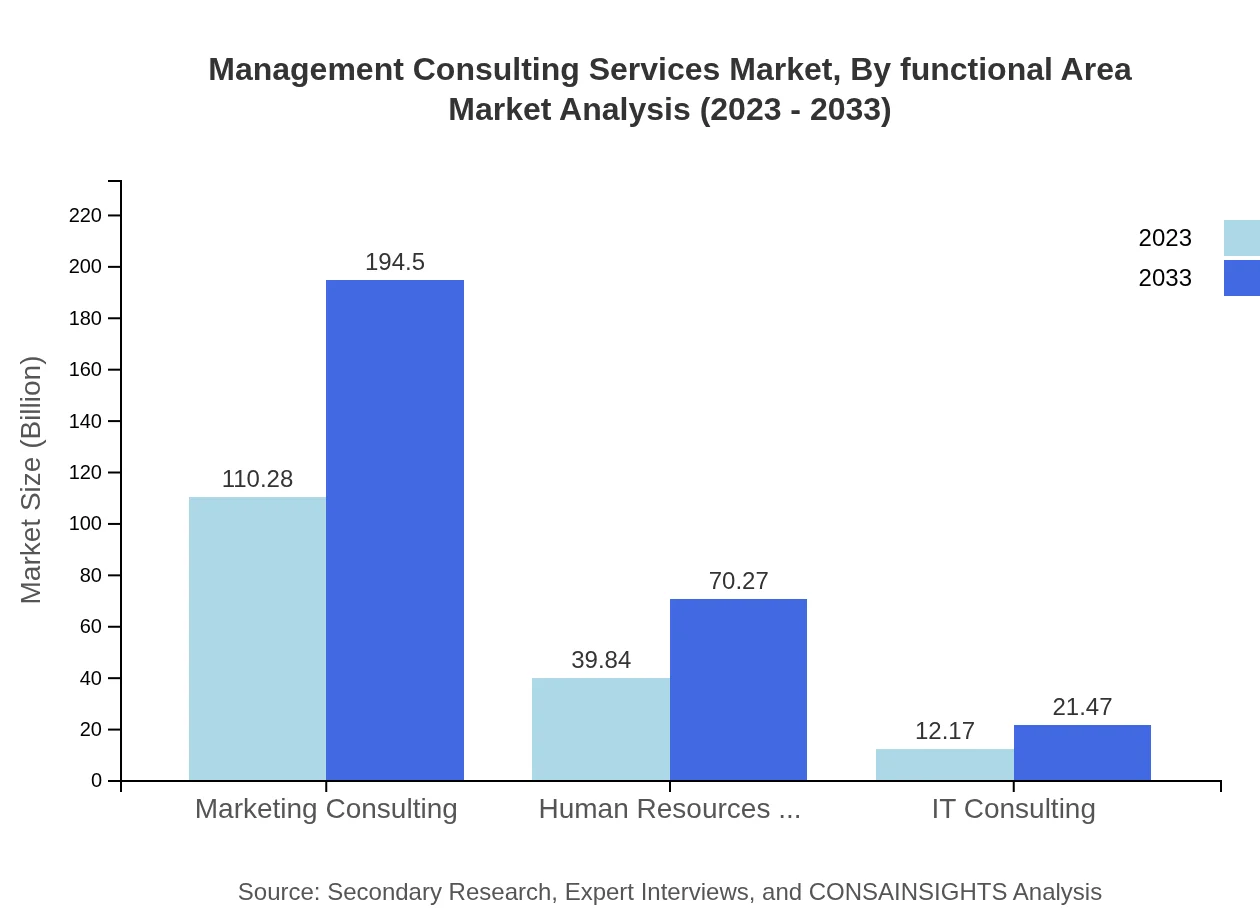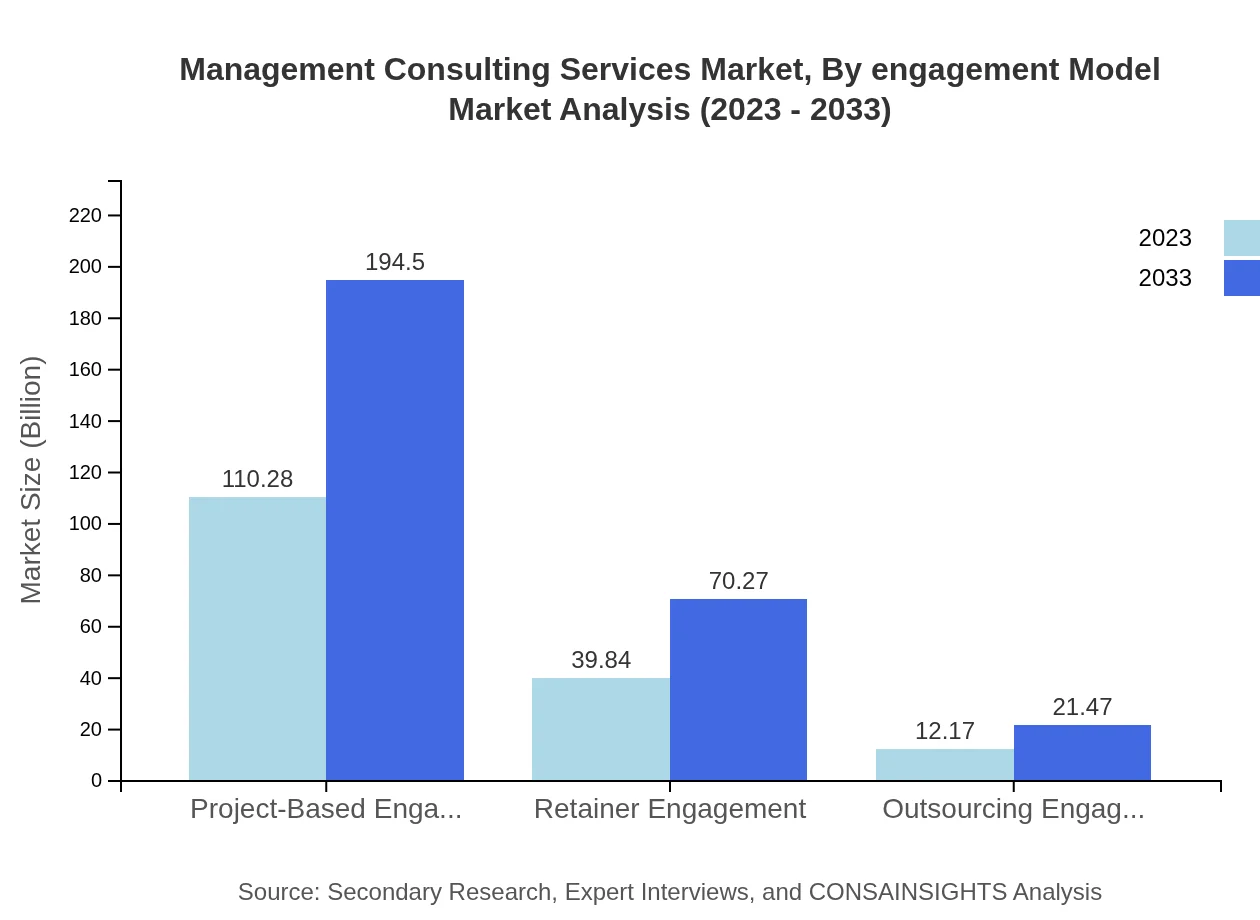Management Consulting Services Market Report
Published Date: 31 January 2026 | Report Code: management-consulting-services
Management Consulting Services Market Size, Share, Industry Trends and Forecast to 2033
This report provides a comprehensive analysis of the Management Consulting Services market, detailing insights and forecasts from 2023 to 2033, including market size, growth trajectories, segmentation, and key players driving the industry.
| Metric | Value |
|---|---|
| Study Period | 2023 - 2033 |
| 2023 Market Size | $162.30 Billion |
| CAGR (2023-2033) | 5.7% |
| 2033 Market Size | $286.24 Billion |
| Top Companies | McKinsey & Company, Boston Consulting Group (BCG), Bain & Company, Accenture, Deloitte Consulting |
| Last Modified Date | 31 January 2026 |
Management Consulting Services Market Overview
Customize Management Consulting Services Market Report market research report
- ✔ Get in-depth analysis of Management Consulting Services market size, growth, and forecasts.
- ✔ Understand Management Consulting Services's regional dynamics and industry-specific trends.
- ✔ Identify potential applications, end-user demand, and growth segments in Management Consulting Services
What is the Market Size & CAGR of Management Consulting Services Market in 2023?
Management Consulting Services Industry Analysis
Management Consulting Services Market Segmentation and Scope
Tell us your focus area and get a customized research report.
Management Consulting Services Market Analysis Report by Region
Europe Management Consulting Services Market Report:
Europe's management consulting market is characterized by fluctuations in economic conditions; it stood at $42.73 billion in 2023 and is projected to grow to $75.37 billion by 2033. The focus on sustainability and digital transformation are key growth drivers.Asia Pacific Management Consulting Services Market Report:
The Asia Pacific region's market size is valued at $33.42 billion in 2023, expected to grow to $58.94 billion by 2033. This growth is attributed to rapid economic development, a burgeoning tech sector, and increasing investment in infrastructure and healthcare consulting services.North America Management Consulting Services Market Report:
North America dominates the market with a size of $60.34 billion in 2023, expected to reach $106.42 billion by 2033. The growth is fueled by major technological advancements and corporations seeking expertise to navigate complex regulatory environments.South America Management Consulting Services Market Report:
In South America, the market is projected to grow from $9.62 billion in 2023 to $16.97 billion by 2033, driven by investments in economic recovery and public sector consulting aimed at enhancing efficiency and transparency.Middle East & Africa Management Consulting Services Market Report:
The Middle East and Africa market is valued at $16.18 billion in 2023, with expectations to reach $28.54 billion by 2033. Growth is driven by diversification initiatives across economies, necessitating extensive consulting services.Tell us your focus area and get a customized research report.
Management Consulting Services Market Analysis By Service Type
The Management Consulting Services market can be significantly categorized into different service types: Strategy Consulting, IT Consulting, Operations Consulting, and Financial Advisory. Strategy Consulting leads in market size with an expected value of $194.50 billion by 2033, showing a significant share growth from $110.28 billion in 2023. Similarly, IT Consulting, which is projected to grow from $12.17 billion to $21.47 billion, emphasizes the increasing investments in digital strategies. Operations Consulting is also growing, enhancing operational efficiencies across industries.
Management Consulting Services Market Analysis By Industry
Industrially, the healthcare sector accounts for a considerable share, with a market size projected to escalate from $84.44 billion to $148.93 billion by 2033, emphasizing the importance of consultancy in regulatory compliance and operational efficiency improvements. Other key industries such as manufacturing and retail illustrate growth patterns due to consulting services guiding modernization and customer engagement strategies.
Management Consulting Services Market Analysis By Functional Area
Functional areas benefiting from consulting services include strategy for top management decision-making, IT divisions for digital transformation, and operational areas for efficiency improvements. The emphasis on aligning technology with business need spurs demand in IT Consulting and Operations sectors, fostering a more agile approach to business challenges.
Management Consulting Services Market Analysis By Engagement Model
Engagement models such as Project-Based Engagement and Retainer Engagement are critical. Project-Based Engagement is projected to grow from $110.28 billion to $194.50 billion by 2033, showcasing the demand for temporary expert interventions. Conversely, Retainer Engagement is also significant, increasing from $39.84 billion in 2023 to $70.27 billion by 2033, indicating a shift towards long-term partnerships between clients and consultants for sustained growth.
Management Consulting Services Market Trends and Future Forecast
Tell us your focus area and get a customized research report.
Global Market Leaders and Top Companies in Management Consulting Services Industry
McKinsey & Company:
One of the oldest global consulting firms, McKinsey specializes in management and strategy consulting, providing cutting-edge solutions to major businesses worldwide.Boston Consulting Group (BCG):
A leader in business strategy consulting, BCG helps organizations with growth strategies, digital transformation, and operational improvements.Bain & Company:
Bain focuses on improving client relationships with private equity and consulting firms, enhancing strategy, marketing, organization, and operations.Accenture:
Accenture is known for its technology consulting capabilities, integrating advanced technology solutions to help businesses enhance efficiency.Deloitte Consulting:
Providing a wide range of consulting services, Deloitte helps organizations manage financial, operational, and technological changes effectively.We're grateful to work with incredible clients.









FAQs
What is the market size of management consulting services?
The global market size for management consulting services is currently approximately $162.3 billion, with a projected CAGR of 5.7% through 2033, indicating strong future growth in the sector.
What are the key market players or companies in this management consulting services industry?
Prominent companies in the management consulting services industry include McKinsey & Company, Boston Consulting Group, Bain & Company, Deloitte, and Accenture, which play a significant role in shaping industry trends.
What are the primary factors driving the growth in the management consulting services industry?
Key growth drivers include increasing demand for digital transformation, rising complexity of business processes, globalization, and the need for organizations to enhance operational efficiency.
Which region is the fastest Growing in the management consulting services?
Asia Pacific shows the fastest growth, with the market expected to expand from $33.42 billion in 2023 to $58.94 billion by 2033, highlighting the region's increasing demand for consulting services.
Does ConsaInsights provide customized market report data for the management consulting services industry?
Yes, ConsaInsights offers customized market report data tailored to the management consulting services industry, allowing businesses to access specific insights based on their strategic needs.
What deliverables can I expect from this management consulting services market research project?
Deliverables may include comprehensive reports, market analysis, segmentation studies, competitive landscape reviews, and actionable recommendations tailored to client objectives.
What are the market trends of management consulting services?
Current trends include a shift towards digital consulting, increased focus on sustainability, expansion of agile methodologies, and heightened collaboration between consulting firms and technology providers.

